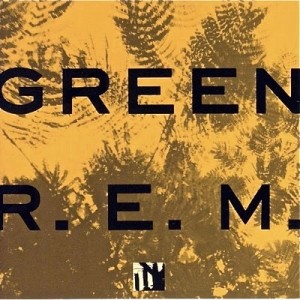
The cover of “Green” (R.E.M’s major label debut) is meant to be stared at for a while. Then, if you close your eyes the negative image you will see will be all green. I must admit it never worked out like that for me. Who knows, maybe you need the assistance of a Mr. Tambourine Man for the trick to be done!
Transition albums necessarily fall into any of two categories. They either capture an artist in a completely unsure frame, or they convey a graceful broadening of horizons that results in a mixture of old and new sounds in a way seeming entirely natural.
I seem to believe that most transition albums fall in the former category, whereas I can count on one hand those who do deliver something as enticing as what the artist always has to offer. One of the few examples of “successful” transition albums to me is XTC’s “English Settlement”, an album that I find so intoxicating that I have listened to it a trillion times, and will have to do so a trillion times more before feeling I am capable of expressing its every nuance.
And right besides that album by the unique British art rockers I have to place “Green”, the first album R.E.M was to release for Warner. The year was 1988, and the band had signed with the major record label looking for broader promotion. By that point they had the right qualifications, of course – hits like “The One I Love” and “It’s the End Of The World As We Know It (And I Feel Fine)” were just the tip of the iceberg.
“Green” was to mark a series of firsts for the band. To begin with, three songs were to feature Buck’s mandolin prominently on the mix, and they all three worked more than fine, with the first of them (“You Are The Everything”) announcing a change of tack that was to led to an artistic renaissance for the Athens’ band. Secondly, Stipe changed his MO – he began writing songs in situ, as the others were throwing musical ideas around. Many songs’ lyrics were to have a cumulative effect such as the biting “I Remember California” in which Michael sings “I recall it wasn’t fair, recollect it wasn’t fair, remembering it wasn’t fair” in order to express bottled feeling with an unparalleled precision. The same approach was employed on “World Leader Pretend” (“I demand a rematch, decree a stalemate, I divine my deeper motives” – note the alliterations in both examples), and that is not counting the many enumerations are mirrored structures like the first line of every verse in “Pop Song 89”, an aptly-named tune that presaged some (far more radical) poppier moments that were to come such as “Shiny Happy People”.
That will always be the most endearing aspect of the disc – how the transition could be so balanced, and the melding of pop and folkier elements could sit besides harder rocking offerings like “Turn You Inside-Out”. The album is characterized by the fact that it goes to no extreme, and that songs which are dissimilar end up making an equilibrated whole.
Maybe the change was motivated by the instrumentalists rotating their roles along with Michael’s willingness to sing more clearly. In fact, “World Leader Pretend” (a song that announced a more politically-conscientious message alongside “Orange Crush”) was to become R.E.M’s first song whose lyrics were printed as part of the package. That was something Stipe had opposed to for a long time, and such a fact simply showed he was opening up for good.
The other hit of the album (it topped the modern charts, just like “Orange Crush”) was to be “Stand”, a song carried by a rhythm that was every bit as playful as the lyric. The band were to eventually disown the song, but they remained aware enough of its quality so as to include it as part of the “In Time” anthology along with the megaphone-powered “Orange Crush” (and yes, that was the first time Stipe sang like that – he was to reuse the trick several times over the discs that ensued).
As I said above, the record holds its own because it is all so well-proportioned. It recalls some of their previous fire while hinting at their pop potential and more serene compositions. It even had a track signaling their embrace of a grungier sound much farther down the line – the song “Turn You Inside-Out” preceded “Monster” by more than six years. Not many bands have albums that so effectively encapsulate every past, present and future facet of their sound. Ultimately, that simply makes R.E.M.’s debut for Warner stand even more precious after all these years.
Rating: 8.5/10

Pingback: Out Of Time (REM) – Album Review | MusicKO